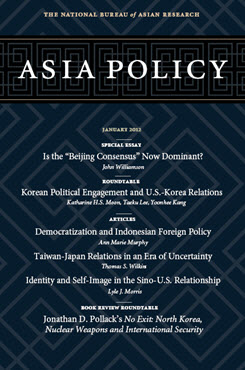Taiwan-Japan Relations in an Era of Uncertainty
This article examines the substance and dynamics of contemporary Taiwan-Japan relations and considers potential avenues for the consolidation and expansion of bilateral cooperation.
EXECUTIVE SUMMARY
MAIN ARGUMENT
Taiwan and Japan are acutely affected by shifting power balances in the Asia-Pacific. While increasing economic interdependence with China works to secure economic prosperity and reduce tensions, negative shifts in the strategic balance portend adverse long-term implications for both countries’ national security. Informal and formal alignment with the U.S. reassures Taipei and Tokyo in the face of a potential Chinese threat but simultaneously generates concerns that Sino-American rivalry will entrap them in a great power conflict. As a result of these external contexts and Taiwan’s unofficial diplomatic status, moves to solidify bilateral relations, though mutually desirable, must be handled with caution. Instead of direct military-defense cooperation, Taiwan and Japan might profitably explore collaboration on nontraditional security issues such as climate change, pandemics, or transnational crime. In particular, both countries’ recent national defense white papers place strong emphasis on disaster relief operations. Joint cooperation in this sphere would strengthen bilateral relations and lay the foundation for a deeper and expanded partnership. Such efforts would enhance Taiwan’s international space and security, building on the close democratic, economic, and cultural ties that already unite Taipei and Tokyo.
POLICY IMPLICATIONS
- Both Taiwan and Japan are feeling the pressure of a rising China and have every incentive to deepen their relations in the face of shared challenges. Bilateral cooperation on nontraditional security issues, especially disaster relief, provides such an opportunity.
- There are three main policy options for advancing the Taipei-Tokyo alignment: (1) continue a close bilateral relationship “as is,” (2) form a strategic partnership based on the model of Japan’s relations with Australia and India, or (3) enter into a virtual trilateral alliance with the U.S.
About Asia Policy
Asia Policy is a peer-reviewed scholarly journal presenting policy-relevant academic research on the Asia-Pacific that draws clear and concise conclusions useful to today’s policymakers. Asia Policy is published quarterly in January, April, July, and October and accepts submissions on a rolling basis. Learn more


